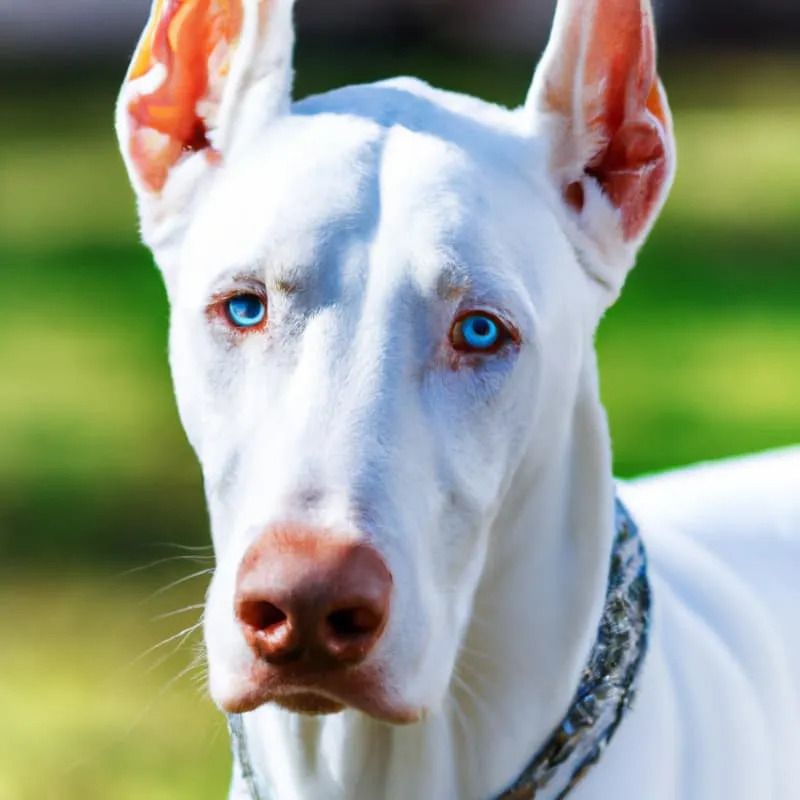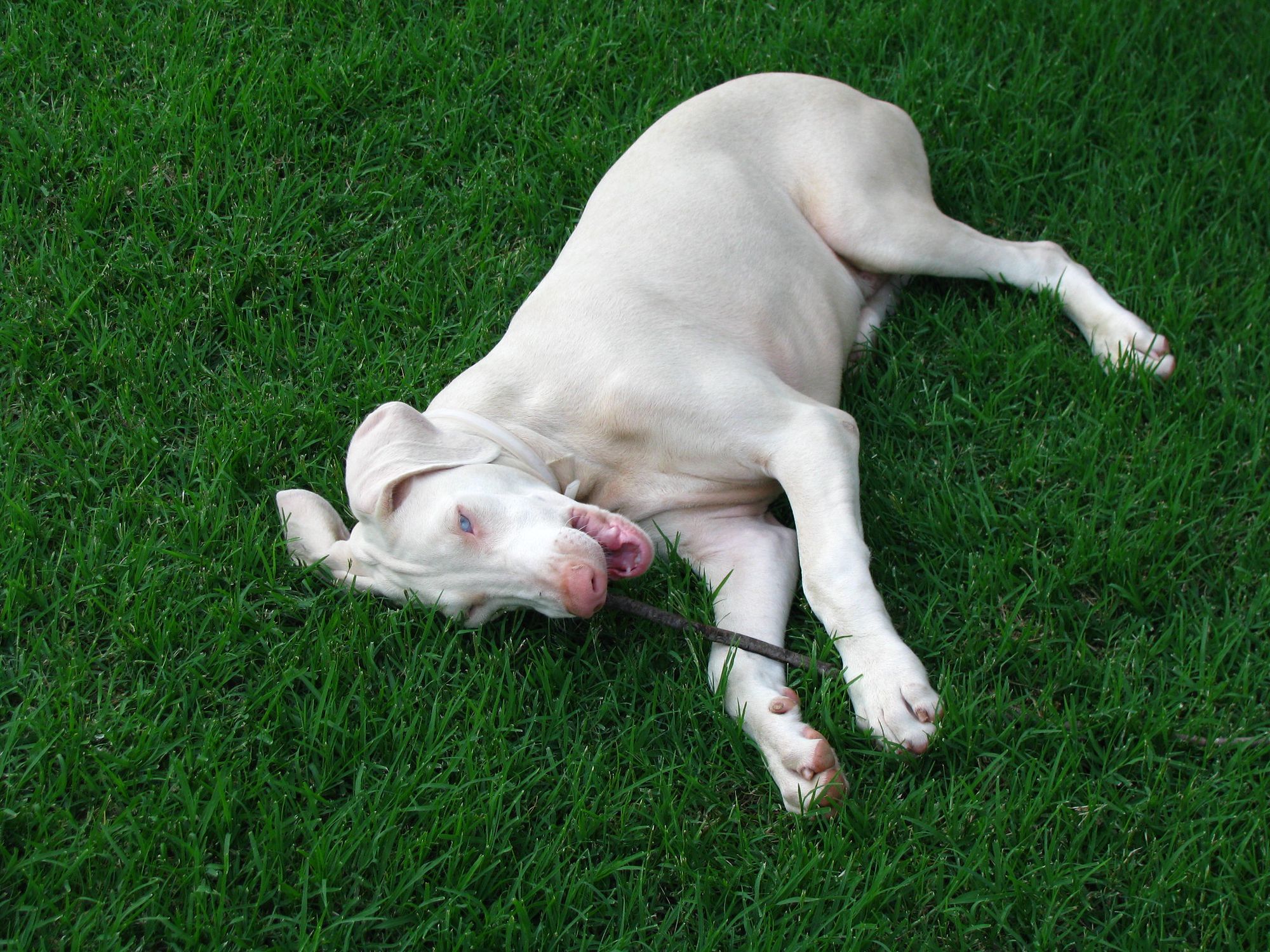When it comes to canine companions, the Doberman Pinscher is a breed that stands out for its loyalty, intelligence, and striking appearance. While the traditional Doberman is known for its sleek black and tan coat, there is another variation that captures the hearts of dog enthusiasts worldwide—the white Doberman puppy. Here, we will explore the unique characteristics, care requirements, and considerations for welcoming a white Doberman puppy into your family.

White Doberman puppies have a striking appearance due to a genetic mutation that affects dog's coat color. Unlike the traditional black and tan Dobermans, these puppies are born with a cream or white coat, pale blue or light-colored eyes, and pink noses. This unique coloration sets them apart from their counterparts, making them an object of fascination for many dog lovers.
The Origins of White Dobermans
The existence of white Doberman puppies can be traced back to a specific gene mutation. The responsible gene, known as the "color dilution gene," affects the pigmentation of the coat, resulting in white or cream coloration. However, it's crucial to note that this gene mutation is controversial within the Doberman Pinscher breed, and white Dobermans are not recognized by major kennel clubs due to potential health concerns associated with the gene.
Characteristics of White Doberman Puppies
White Doberman puppies share many traits with their black and tan counterparts. They are known for their intelligence, loyalty, and protective nature. While their coat color may be different, their temperament remains the same. White Dobermans are often described as affectionate, energetic, and highly trainable, making them excellent companions for active individuals and families.
Health and Genetic Considerations
When it comes to White Doberman Puppies, there are specific health and genetic considerations to keep in mind. The white coat coloration in Dobermans is the result of a genetic mutation that affects pigmentation. While they are generally healthy dogs, there are certain health concerns associated with this specific coloration.

One of the primary concerns is the increased risk of sunburn and skin cancer due to the lack of pigment in their skin. It is crucial to provide ample sun protection for your White Doberman Puppy, especially during the peak hours of sunlight. Applying pet-safe sunscreen and providing shade or protective clothing can help prevent sunburn and reduce the risk of skin issues.
Additionally, some White Doberman Puppies may be prone to certain vision problems, such as cataracts and progressive retinal atrophy (PRA). Regular eye examinations by a veterinarian are essential to monitor and address any potential issues early on.
To ensure the overall health and well-being of your White Doberman Puppy, it is important to schedule regular veterinary check-ups, maintain a balanced diet, and provide adequate exercise and mental stimulation.
Training and Socialization
Training and socialization are crucial aspects of raising a well-behaved and happy White Doberman Puppy. These intelligent and energetic dogs thrive on mental and physical stimulation, making training an essential part of their development. Start training your White Doberman Puppy from an early age, using positive reinforcement techniques. Reward-based training methods, such as treats, praise, and play, will help motivate and encourage your puppy to learn and obey commands. Consistency, patience, and gentle guidance are key to shaping their behavior.

Socialization is equally required for White Doberman Puppies. Expose them to various people, animals, and environments to help them become well-adjusted and confident dogs. Puppy classes, dog parks, and supervised interactions with other pets can contribute to their socialization journey.
Remember that training and socialization should be ongoing throughout their lives. Enroll in advanced training classes to continue their education and maintain their mental and emotional well-being.
Grooming a White Doberman Puppy
Grooming a White Doberman Puppy is relatively easy compared to some other breeds. Their short coat requires minimal maintenance, but regular grooming sessions are still typical to keep them clean and healthy.
Brush your White Doberman Puppy's coat once or twice a week using a soft-bristled brush or grooming mitt. This helps remove loose hair, promotes a healthy coat, and provides a bonding experience between you and your furry companion.
Bathing should be done as needed, typically every few months or when they get particularly dirty. Use a mild dog shampoo and ensure thorough rinsing to prevent any residue. Remember to pay attention to their ears and clean them regularly to prevent infections.
Maintaining good dental hygiene is essential for White Doberman Puppies. Brush their teeth regularly with dog-friendly toothpaste and provide appropriate chew toys to promote dental health.
Exercise and Activity Needs
White Doberman Puppies are energetic and athletic dogs that require regular exercise to keep them happy and healthy. Engaging in physical activities not only helps them burn off excess energy but also stimulates their minds.
Provide your White Doberman Puppy with daily exercise, including brisk walks, runs, and playtime. Engaging them in mentally stimulating activities, such as puzzle toys or obedience training, is equally demanded. These activities keep their minds sharp and prevent boredom, which can lead to destructive behaviors.

Consider participating in dog sports like agility or obedience trials, as these activities provide both physical and mental stimulation for your White Doberman Puppy. Remember to tailor the exercise regimen to their age and health condition, gradually increasing intensity as they grow older.
Feeding and Nutrition
Feeding your White Doberman Puppy a well-balanced and nutritious diet is crucial for their growth and overall health. Consult with your veterinarian to determine the appropriate type and amount of food suitable for their age, weight, and activity level.
Choose a high-quality dog food that is specifically formulated for large breeds. Look for options that contain essential nutrients such as protein, healthy fats, vitamins, and minerals. It's typical to follow the recommended feeding guidelines provided by the manufacturer and adjust portion sizes as your puppy grows. Avoid overfeeding or free-feeding, as Dobermans have a tendency to gain weight if not properly monitored. Obesity can lead to various health issues and put unnecessary strain on their joints.
Additionally, always provide fresh water for your White Doberman Puppy and ensure they have access to it throughout the day. Proper hydration is essential for their overall well-being.
White Doberman Puppy as a Family Pet
White Doberman Puppies can make excellent family pets, bringing joy and companionship to households. Their loving and loyal nature makes them ideal for families of all sizes, including children. However, it is essential to supervise interactions between young children and White Doberman Puppies to ensure mutual respect and safety. Teach children how to properly approach and handle the puppy, and never leave them unsupervised together.
White Doberman Puppies thrive in homes where they receive plenty of attention, love, and mental stimulation. They enjoy being part of family activities and forming strong bonds with their human companions. Regular socialization with other dogs and exposure to different environments will help them become well-rounded and confident family members.
Choosing a Reputable Breeder
When considering a white Doberman puppy, it is crucial to choose a reputable breeder who prioritizes the health and well-being of their dogs. A responsible breeder will conduct necessary health screenings, provide proper care for the puppies, and offer guidance and support to prospective owners. They will also be transparent about the potential health risks associated with the white Doberman gene.
Introducing Your White Doberman to Other Pets
Proper introductions and gradual socialization are significant when introducing a white Doberman puppy to other pets in the household. Slowly acclimate them to new environments and allowing supervised interactions will help ensure a harmonious relationship between the new puppy and existing pets. Positive reinforcement and reward-based training can also aid in facilitating a smooth integration.

While White Doberman Puppies are beautiful and loving creatures, owning one comes with its own set of challenges. It is critical to be aware of these challenges before bringing a White Doberman into your home. In this article, we will discuss some potential challenges associated with owning a White Doberman and provide insights on how to address them.
1. Health Concerns
One of the primary challenges specific to White Doberman Puppies is their potential health concerns. Due to the genetic mutation responsible for their white coat coloration, they may have an increased risk of certain health issues. These include sunburn, skin cancer, and potential vision problems.
To mitigate these risks, provide adequate sun protection for your White Doberman, especially during peak hours of sunlight. Apply pet-safe sunscreen to exposed areas of their skin and provide shade or protective clothing when necessary. Regular veterinary check-ups and eye examinations are also crucial for monitoring their health and addressing any potential issues.
2. Socialization and Training Needs
White Dobermans, like any other Doberman, require proper socialization and training to ensure they grow into well-behaved and balanced dogs. However, some White Doberman Puppies may exhibit shy or nervous tendencies, which can make socialization and training more challenging.
Start socializing your White Doberman Puppy from an early age, exposing them to different people, animals, and environments. Gradually introduce them to new experiences, ensuring positive and rewarding interactions. Enroll them in puppy classes or seek the guidance of a professional dog trainer who specializes in working with Dobermans.
Consistent training using positive reinforcement methods is essential. Be patient, gentle, and consistent with your training efforts, focusing on building a strong bond of trust with your White Doberman. Seek the guidance of professional trainers if you encounter specific challenges or behavioral issues.
3. Exercise and Mental Stimulation Requirements
White Dobermans are energetic and intelligent dogs that require ample exercise and mental stimulation. Failing to meet their needs can result in boredom, frustration, and potentially destructive behaviors.
Provide daily exercise, including physical activities such as walks, runs, or engaging in dog sports. Mental stimulation is equally needed, such as puzzle toys, obedience training, or interactive play sessions. Engaging their minds and bodies will help prevent behavioral problems and ensure their overall well-being.
4. Careful Breeder Selection
Another challenge associated with White Doberman ownership is finding a reputable breeder. Not all breeders prioritize the health and welfare of their dogs or follow responsible breeding practices. It is crucial to do thorough research and find a breeder who focuses on the well-being of the puppies and the breed as a whole.
Look for breeders who perform health tests on their breeding stock, provide proper care and socialization to the puppies, and have a good reputation in the dog community. Visiting the breeder's facility if possible and asking for references from previous puppy buyers can help ensure you are making an informed and responsible decision.
Conclusion
In conclusion, white Doberman puppies are a unique and beautiful variation of the Doberman Pinscher breed. Their striking appearance, coupled with their intelligence and loyalty, make them an intriguing choice for dog lovers. However, it is essential to approach the acquisition of a white Doberman puppy with careful consideration, ensuring that their health, training, and socialization needs are met. By providing a loving and stimulating environment, you can enjoy a fulfilling and joyful companionship with your white Doberman.
Frequently Asked Questions (FAQs)
1. Are white Dobermans rare?
White Dobermans are relatively rare compared to the traditional black and tan Dobermans. However, it is vital to note that they are not recognized by major kennel clubs due to concerns related to gene mutation.
2. Do white Dobermans have health issues?
White Dobermans may be more prone to certain health issues associated with the gene mutation, such as hearing loss and skin conditions. Working with a reputable breeder who conducts health screenings is essential.
3. Can white Dobermans be shown in dog shows?
White Dobermans are not eligible to participate in conformation shows recognized by major kennel clubs. However, they can still participate in performance events and activities that assess their skills and abilities.
4. Are white Dobermans more aggressive?
White Dobermans, like any other Doberman, are not inherently aggressive. Their temperament depends on various factors, including their genetics, upbringing, training, and socialization.
5. Are white Dobermans suitable for families with children?
White Dobermans can be suitable for families with children if they are properly trained, socialized, and provided with a loving and stimulating environment. Supervision and teaching children how to interact respectfully with good family dogs are necessary for a harmonious relationship.






